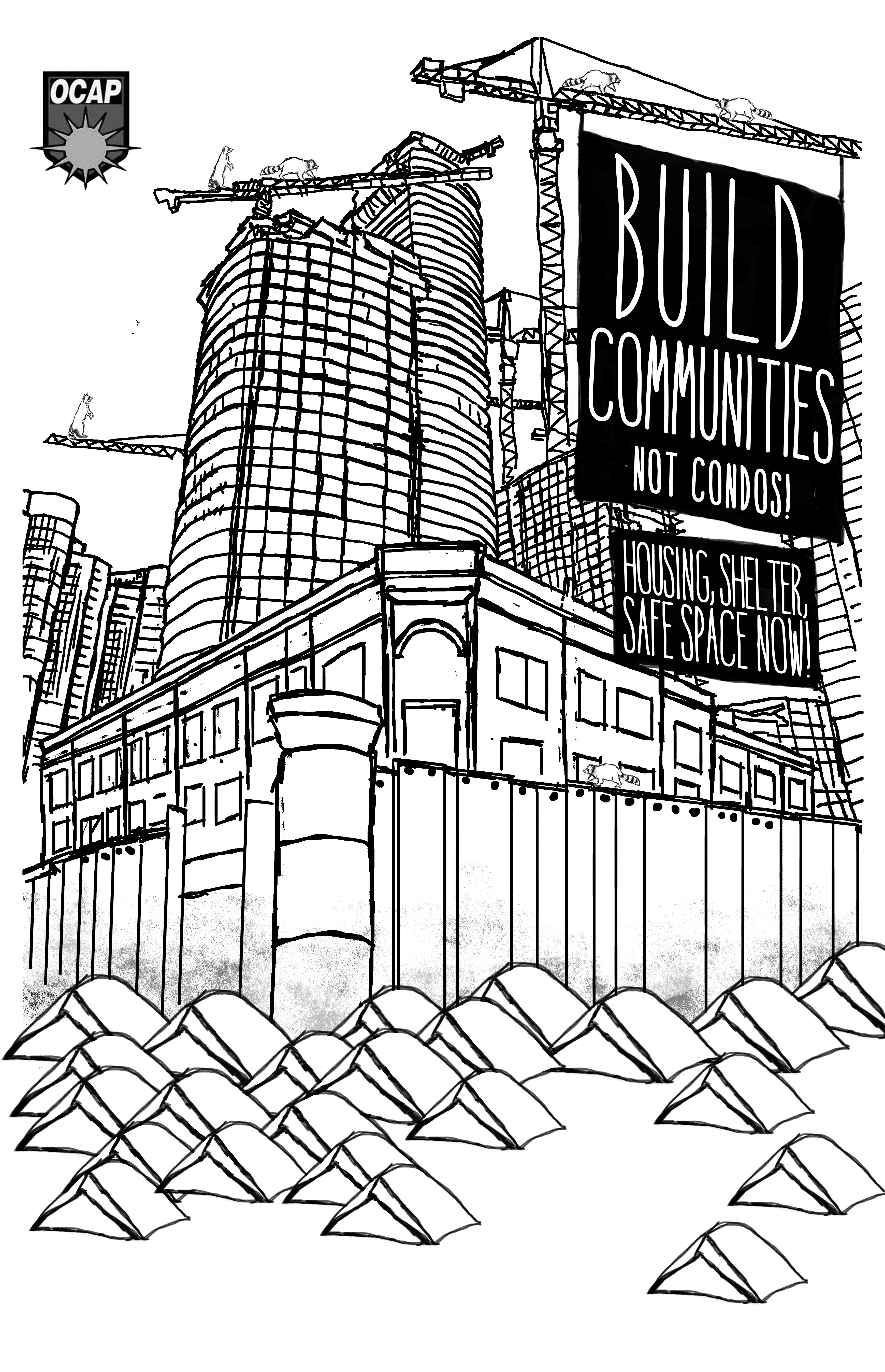The City of Toronto faces a massive housing crisis. Shelters are bursting at the seams (see OCAP’s recent shelter stats statement) and the waitlist for social housing is over 10 years long. Since the Harris government eliminated rent control in the 1990s, the cost of housing has skyrocketed. Welfare rates remain so far below the poverty line that decent housing is out of reach for people on social assistance. The average cost of a bachelor apartment in the City is $837/month while the maximum amount on a single welfare cheque is $626/month.
Governments are not serious about building housing and protecting the rights of poor people. This past February a modest proposal for the development of a national housing strategy, C-400 (The Secure, Adequate, Accessible, and Affordable Housing Act), was trampled by the Harper government. Municipal governments would gladly hand over all vacant properties for redevelopment into condos and luxury housing, without basic measures to address the impact this has on communities. Development and re-development proposals fly through the City of Toronto or the Ontario Municipal Board at an astonishing rate with no expectations or quotas around building social housing.
As governments push their austerity agendas, anti-poverty activists have been fighting to increase funding for housing and shelters. There have been victories in this fight — the closure of the School House Shelter was stopped by community mobilization, and in April 2013, that same pressure resulted in council passing a motion to set 90 per cent as the maximum occupancy rate for city shelters.
These small, but important victories show the power of direct action and mass mobilization. In that spirit, OCAP and its allies are stepping up their campaign to push forward the demand of housing for all.
Expropriation of properties: Use it or lose it!
Expropriation laws give governments the power to take over land for public use. Governments usually expropriate to build highways and other infrastructure, but there are a few cases where activists have built successfully ‘use it or lose it’ expropriation campaigns. They forced the government to buy abandoned properties and convert them into housing.
In April 1997, activists squatted abandoned properties at 88-90 Carlton St. The provincial and federal governments later bought that property for use as social housing as part of the Regent Park development. In 2006, a “use it lose it” campaign led to a major housing victory in Toronto. The city voted to expropriate 1495 Queen Street West, a privately owned building in Parkdale that had sat empty and had been neglected for eight years. In January 2011, Edmund Place was officially opened at the site. The building offers twenty-nine self-contained apartments to low-income members of the Parkdale community. Edmund Place had been named after Edmund Yu, a homeless man who was gunned down by Toronto police in 1997.
‘Taking it Back’ rally
On September 22, 2013, activists will rally under the banner “Taking it Back: Housing, Shelter, Safe Space Now.” The rally will begin at Allan Gardens and involves are march to various abandoned properties in Toronto’s Downtown East (DTE). The DTE is one of the poorest neighbourhoods in the country where a huge number of people live on the streets surrounded by a mix of vacant property and condo developments.
Many of these properties used to be rooming houses — the de facto ‘affordable’ housing and single rooms of the neighbourhood. As the neighbourhood gentrified, these locations have been converted back to single family homes, sold to condo developers or left sitting empty.
The rally on the 22nd will serve as the launch of a new, long-term, community-based ‘use it or lose it’ campaign to demand that the city expropriate specific abandoned properties for new social housing, drop-ins, safe consumption sites, and other services that poor people need. Alongside this, there will be a demand for a moratorium on the development of condos and luxury lofts.
OCAP and our allies plan to fight gentrification and a massive housing crisis by taking back some of the property-based wealth in the neighbourhood. Only through sustained community mobilization and taking direct action can we stave off the onslaught of gentrification, claim space, and win real demands.




